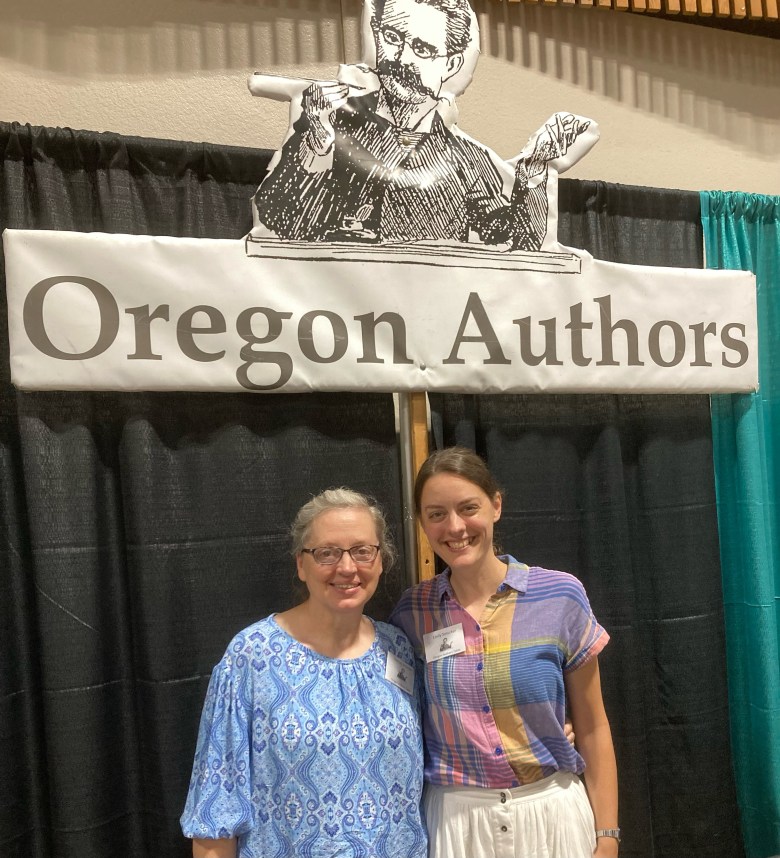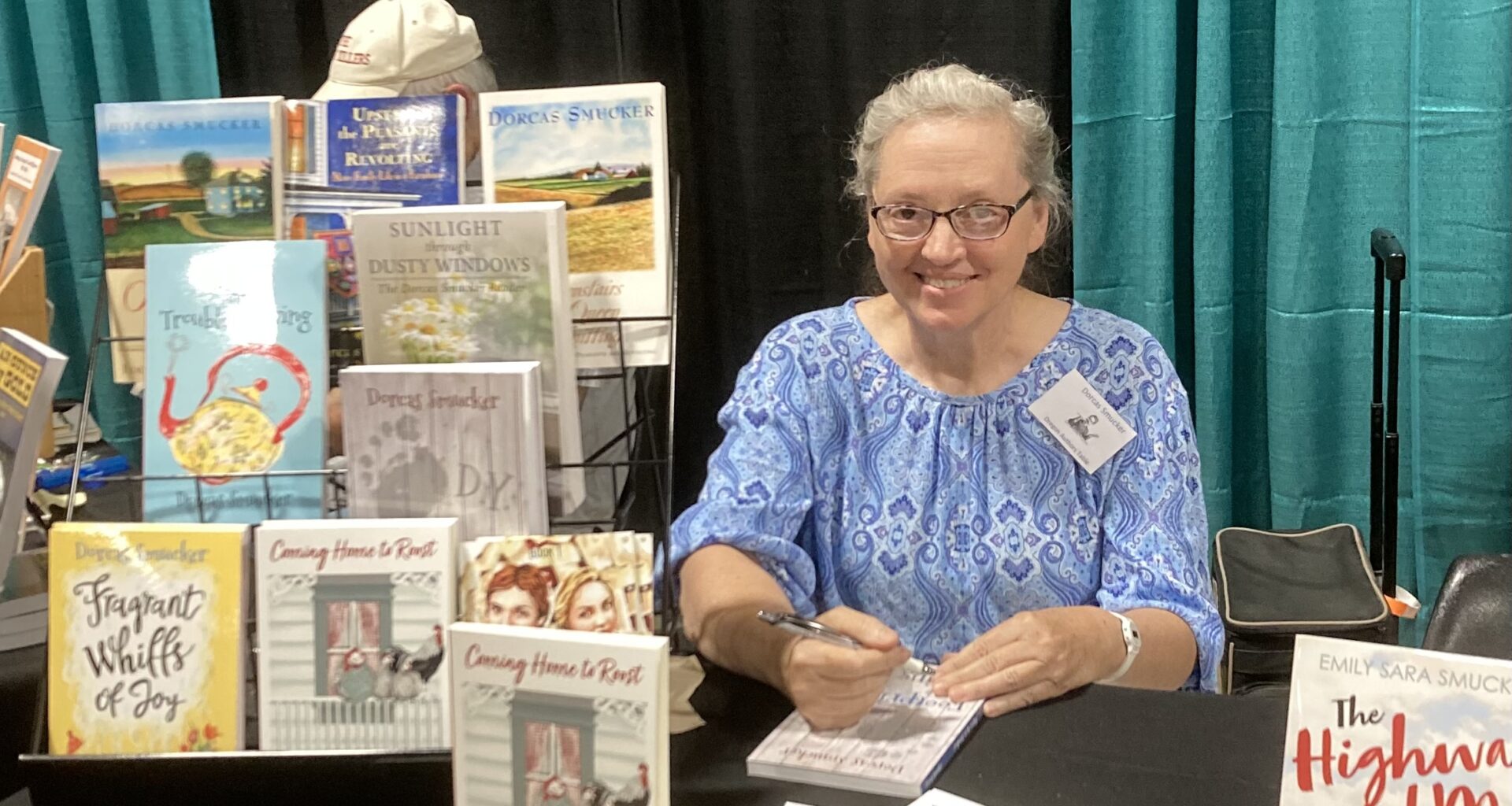QuickTake:
The author shows her daughter the ropes, spending a couple of days trying to pitch passers-by at the Lane County Fair authors’ booth: “Authors are notoriously better at writing than marketing”
I am teaching my daughter the ways of author events as we set up at the Lane County Fair. “If someone says, ‘I had a lot of good conversations,’” I tell her, “it actually means, ‘I didn’t sell any books.’”
Whether at the county fair, the state fair or the annual library fundraiser, book sales have their own rules, rituals and traditions.
Hauling boxes of books from the bumpy, grassy parking area to the Lane Events Center in the July heat is always a challenge. The author Bob Welch once told me that the real competition isn’t who sells the most books but who has the niftiest book hauler.
Then he flicked his wrist and unfolded an aluminum wheeled device that clicked into position with authority and smooth precision. We all looked on enviously. Bob beat all the competition that day.
The fair lasts five days. Emily and I signed up for two of them, thanks to Jason Kilgore who organized the authors’ display and invited us. Emily has written two books; I have nine.
 The author with her daughter, Emily, at the authors’ table at the Lane County Fair this July.
The author with her daughter, Emily, at the authors’ table at the Lane County Fair this July.
While we enjoy chatting with readers and selling books, the lasting memories are made by sitting beside other authors for an afternoon, or a day, or a week. Authors are notoriously better at writing than marketing, so we quietly observe each others’ techniques. What’s the best way to snag a tired fairgoer who is wandering by eating a dish of ice cream or pushing a stroller?
Jason draws readers in with, “Do you like to read fantasy?” much like Carola Dunn used to bring people to her display of Daisy Dalrymple books with “Do you like to read mysteries?”
Some of us are less assertive, making eye contact and smiling. After two hours of waiting for the traffic to pick up, we try to look welcoming but not desperate. Heaven forbid that I impose on people who are there only for the air conditioning.
We are also hungry by this time, leading to another conundrum. If we pull the ham and cheese sandwich out of our tote bag and take a large bite, a potential customer will immediately appear and ask what our books are about. So we nibble furtively.
“My marketing strategy is to compliment people on what they’re wearing,” Emily says, calling out to mention a young woman’s strawberry-shaped purse and a woman’s lace-trimmed straw hat.
I sit beside Joe Blakely, who has written 20 books about Oregon topics — from Bigfoot to the Highway 101 bridges. He is a congenial and constant presence at the end of the row of tables.
I could easily sell Joe’s fascinating historical books for him, such as the story of the “Tall Firs” that I bought years ago for our son. In fact, as the hours pass, we authors memorize each other’s spiels without even trying. Jason’s is “This is a fantasy series written from the point of view of an ancient dragon and a young female mage.” Last year at the state fair I asked him what a mage is. “Essentially a magician,” he said. He attracts so many customers that some of us wonder if we should switch genres and venture into fantasy.
At the table beside us, Guy Maynard explains that he came to Oregon from Boston in 1971 to start a communal farm and live off the land. He has pictures of himself and his wife, genuine members of the hippie movement. “I was raised in that era,” a woman says, nodding at Guy’s photos. Like many of Eugene’s ex-hippies, she tells him her adventuresome story. But she walks off without buying. “Almost!” Guy says.
His two-hour shift ends, and he packs up to leave. “Well, I had a lot of lovely conversations,” he says.
We smile knowingly.
The day goes on. Outside in the sunshine, people are no doubt riding the Ferris wheel and tossing rings to collect stuffed animals. We sit and wait. Emily collects only-in-Eugene quotes from customers. The woman in a long red skirt says, “I kind of developed my own mystical style.” Another, reminiscing on her hippie days, states, “I was part of a loosely affiliated group of cults.” A woman in a white tells me, “I’m Unitarian Universalist, on the progressive side, but I love your writing.”
I realize it’s that connection that makes coming to the fair worthwhile and that motivates us in the hours of silent and solitary writing that precedes our books.
On our final day, Emily makes occasional sales. I do not. I wander off for a cup of coffee. A man who lived on our property in the 1950s tells me what the neighborhood was like back then. Emily gets hot water for tea. At 4 p.m., we dig our boxes and inefficient book haulers from under the table and pack up our business cards, book racks and remaining inventory.
Emily is pleased with her sales that day. I try to be happy for her.
“Oh well,” I tell her, “At least I had a lot of great conversations.”

